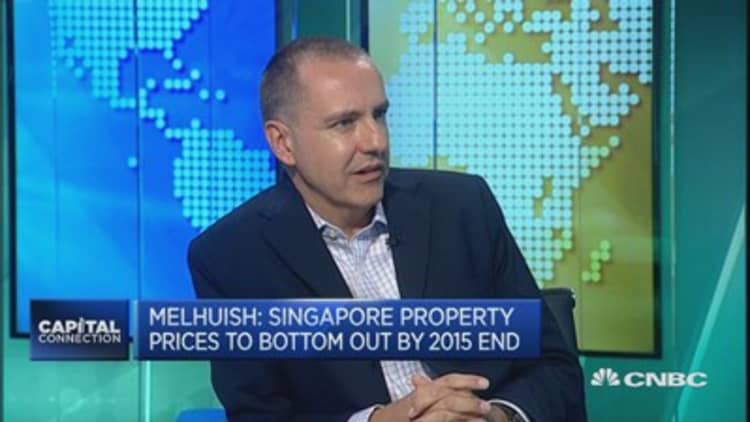
Singapore's private property market has suffered from slackening transaction volumes and falling prices this year and it doesn't look like there's any relief on the horizon, according to a new report.
"The government's cooling measures, especially the limits on financing, continue to be the animating force behind Singapore's housing market, as it has been since its implementation," wrote Steve Melhuish, chief executive officer of Singapore-based real estate portal PropertyGuru, in the company's outlook for the second half.
In the months ahead, developer sales of private homes will continue to receive limited buyer interest, with the number of transactions and price remaining fairly subdued, the Property Guru report published on Wednesday said.
"This narrative is likely to continue into the second half of the year, as the government shows no sign of relenting on the cooling measures yet," Melhuish said.
Developers sold 3,496 private residential units in the first six months of the year, 21 percent lower than the year-ago period, according to real estate services firm JLL.
Slackening sales have taken on a toll on prices, which have declined for seven straight quarters. The private residential property index fell 0.9 percent in the second quarter from the previous quarter, following a 1 percent fall in the previous three months.
PropertyGuru forecasts prices will contract by an additional 2 to 4 percent in the second half of the year to reach an overall decline of 4 to 6 percent for the year.
Developers are expected to continue to dole out discounts in an attempt to entice buyers, but don't expect excessive markdowns, the firm said.
Read MoreWhy this Indonesian property tycoon admires Singapore
"They are not willing to excessively reduce prices beyond 15 percent of sale price, considering high land costs, while some are holding back their launches for the time being in anticipation of improving market conditions," the report said.
Talk of an early general election has fueled speculation that the government could ease its hard-hitting cooling measures as early as December to boost sentiment in the market.
The government has imposed eight rounds of measures since 2009 to cool the housing market, taking aim at foreign demand and speculation.
Real estate consultant CBRE, which expects the general election will take place in September or October of this year, anticipates the Additional Buyers Stamp Duty (ABSD) will be tweaked in favor of Singaporeans. Currently, Singaporeans have to pay an ABSD of 7 percent on their second home and 10 percent on third home.
However, comments from the Monetary Authority of Singapore, the city state's central bank, indicate potential buyers shouldn't hold out much hope for a rollback.
Earlier this week, Ravi Menon, managing director at MAS, said it is premature to roll back measures as the price correction so far has been modest.
"Property prices have softened somewhat, but like I said last year, in the context of the price increase that had occurred - 60 percent over three years - the softening we have seen is really not all that much. So, it's still premature to consider removing any of the cooling measures that are in place," he said, according to a local news report.
A renters' market
It's not just sellers feeling the pain. Pressure on the rents is unlikely to ease in the coming months either, the firm said.
Firstly, with a flood of new homes coming on stream, there is a sizable demand-supply imbalance.
Read MoreSingapore luxury property is running out of time
"Housing supply is perhaps the biggest influence on rentals. Private new home completions this year are expected to exceed 26,000 units, with a further 28,000 units by the end of next year. On public housing, there will also be 26,000 new HDB (Housing & Development Board) flats," PropertyGuru said.
"The uptick in demand for the past one year had been just over 15,000 units. This demand-supply imbalance will ultimately impose greater pressure on rents, strong enough to keep the rental market in check, with any significant rise in asking rents by landlords likely to be faced with tenant resistance," it said.
Secondly, expenditure on rent by Singapore's expatriate population – a key driver of the rental market – continues to decline with a reduction in benefit packages.
"As lower expatriate remuneration packages become more common, this will mean leaner budgets for housing in the long run," it said.
The private property rental market saw rents fall by 0.9 percent in the first quarter of 2015, followed by a sharper drop of 3 percent in the second quarter.


